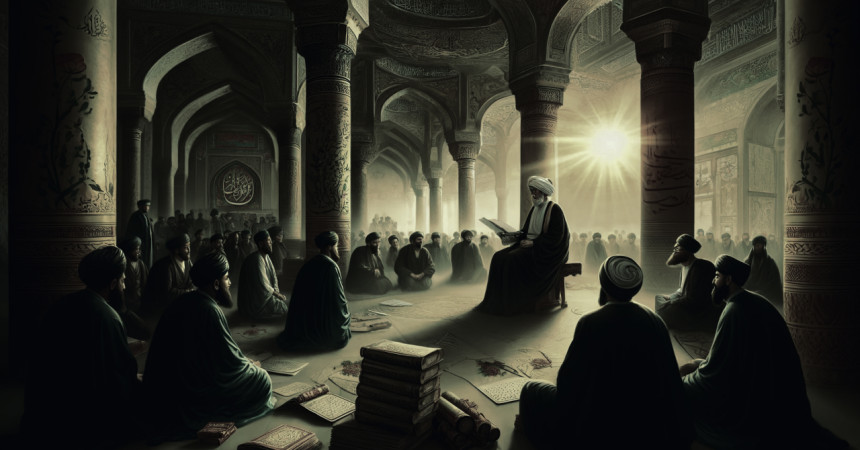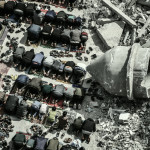1 | 2 | 3 | 4 | 5 | 6 | 7 | 8 | 9 | 10 | 11 | 12 | 13 | 14 | 15 | 16 | 17 | 18 | 19 | 20 | 21 | 22 | 23 | 24 | 25 | 26 | 27 | 28 | 29 | 30
The Umayyads were ruling at the time of the Salaf and their ideological beliefs were generally not corrupted by foreign ideologies. However, during the Abbasid Caliphate, foreign beliefs crept in through the translation of books into Arabic.
Delving into philosophy, many people started to translate texts according to foreign principles such as Greek philosophy. Groups were founded upon these new beliefs. They spread until the offspring of Harūn al-Rashīd, such as Mamūn and Abu Ja’far al-Mansūr.
Sadly, the Caliphs were persuaded that those who did not concur with their beliefs were misguided and the Mihna (Inquisition) started, where scholars were forced to embrace or agree with their beliefs.
Many scholars maintained their stances and used ambiguous words to make it seem that they were in agreement with their rulers’ beliefs, while intending to mean something else. They feared Allah but they feared for their lives, too. Those that did not concur with these blasphemous beliefs were killed.
The paramount scholar of his time
Imam Ahmad ibn Hanbal (raḥimahu Allah) became a beacon of courage during a dark period in Islamic history.
His story, particularly his ordeal during the Mihna under the Abbasid Caliphate, is a powerful reminder of the fight to preserve the Islamic tradition.
Indeed, he became known as a man who alone stood as the Ahl al-Sunnah wa-l Jamā’ah of his time, similarly to Abu Bakr al-Siddīq in his fight against the rebels.
Mihna was a time of immense pressure
During this period, scholars were forced to accept a new doctrine that contradicted their core beliefs. Imam Ahmad, along with a courageous few, refused to bend.
This defiance came at a steep cost. He was imprisoned, tortured, and ostracised for clinging to the truth, that the Qur’ān is the word of Allah.
And yet, in spite of the hardships, Imam Ahmad never saw his faith weaken. His resolve wasn’t just a personal victory; it was a triumph for the entire Muslim community, ensuring the preservation of their faith for generations to come.
Lessons in the great Imam’s suffering
From Imam Ahmad ibn Hanbal’s ordeal, we can glean valuable pointers on faith, integrity, and the power of truth.
Holding fast in the storm
Imam Ahmad’s resolute stance in the face of immense pressure echoes a powerful verse from the Qur’ān:
“So hold firm to what you have been given. Indeed, you are on a straight path.” [1]
His life teaches us that clinging to our beliefs, even when it’s difficult, is crucial. He was able to turn the storm around, leading to the repentance of the leaders of the Muslims and eventually defeating misguided beliefs.
Strength rooted in conviction
Driven by his deep faith, Imam Ahmad possessed an immense unyielding strength.
He embodied the hadīth,
“The strong man is not the good wrestler; the strong man is only the one who controls himself when he is angry.” [2]
His struggle reminds us that true strength lies in self-control and holding firm during adversity.
Community is a pillar of support
While Imam Ahmad faced immense pressure, he wasn’t alone. The broader Muslim community eventually rallied around him, celebrating his release.
A prisoner strengthened the Imam’s toughness in the face of being flogged, rejuvenating his determination to stand against tyranny and falsehood.
Additionally, another Imam reminded him that he was the last line of defence, as if he was made to appear in agreement with these beliefs, then most Muslims would have taken on the same.
Action points
-
Deepen your understanding of Islamic principles and beliefs, as knowledge empowers you, particularly when faced with ideological challenges.
-
Stand up for what you believe in; remember, truth isn't always popular, but it's always right!
-
Be a pillar of support by creating a community that supports its members and advocates for truth.
Also read
- The Rise of Fitnah
- The Son of a Soldier
- Legacies Like No Other
- Scholars That Rebelled Against Tyranny
- Understanding the Caliphate: Between Romanticism and Cynicism
1 | 2 | 3 | 4 | 5 | 6 | 7 | 8 | 9 | 10 | 11 | 12 | 13 | 14 | 15 | 16 | 17 | 18 | 19 | 20 | 21 | 22 | 23 | 24 | 25 | 26 | 27 | 28 | 29 | 30
Source: Islam21c
Notes
[1] al-Qur’ān, 43:43
[2] Sahīh al-Bukhārī, 6,114







